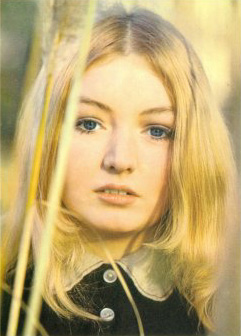| Mary Hopkin  Born: 5-May-1950 Born: 5-May-1950
Birthplace: Pontardawe, Glamorgan, Wales
Gender: Female
Race or Ethnicity: White
Sexual orientation: Straight
Occupation: Singer Nationality: Wales
Executive summary: Those Were the Days Raised in Pontardawe, a predominantly Welsh-speaking town to the north of Swansea, Mary Hopkin was introduced to public singing very nearly as early as she was able to talk. By the age of four she was active in her family's church choir, and throughout her childhood she received encouraged from her teachers to develop her vocal skills. In her teens Mary established herself as a folk singer, singing in clubs and on Welsh television; at 17 she began performing with the band The Selby Set and Mary, as well as being put under contract with Cambrian Records as a solo artist, for whom she recorded four Welsh-language releases (the first of which, Llais Swynol, was released in early May 1968). Not long afterwards, she attended an audition in Cardiff to appear on the ITV talent competition Opportunity Knocks, and it was her subsequent appearance on the show that same May (performing the Biblically-dervied folk standard Turn, Turn, Turn) that started her national (soon to be international) career underway. Mary easily won the competition, leading to a second appearance the following week -- and yet another victory. This pattern would continue for 10 consecutive weeks.
Only the first of these television appearances was necessary to secure her future as a recording artist, as the quality of her performance immediately prompted the popular British model Twiggy to bring the young singer to the attention of her friend Paul McCartney. McCartney invited Hopkin to London for an audition the Monday after the broadcast, and she spent the following morning in the studio recording eight different songs for the Beatle, with Peter Asher acting as engineer. McCartney's offer to put her under contract with Apple Records preceeded the announcement of her initial win on Opportunity Knocks by mere hours. For her first single, Hopkin recorded a McCartney arrangement of Those Were the Days -- an Anglicized version of a traditional Lithuanian melody; the song immediately moved to the top of the charts in the UK (#2 in the States) upon its release at the end of August, cheekily bumping Hey Jude by The Beatles out of that position. In fact, Those Were the Days became so popular that Hopkin went on to record it in five different languages, with each version becoming a hit in its respective corner of the world. Her McCartney-produced full-length debut Post Card appeared in February of 1969 to similarly widespread acclaim.
For her second single Hopkin remained under the shadow of her Beatle benefactor, his composition Goodbye being chosen to occupy the A-side. The song, supported by a UK tour with fellow Welsh crooner Engelbert Humperdinck, once again succeeded in bringing her high into the charts. The following year she was chosen to represent Britain in the notorious "Eurovision Song Contest", an audience vote conducted amongst viewers of The Cliff Richard Show selecting the track Knock Knock Who's There (a song for which Hopkin reportedly had a strong dislike) to be her entry; the tune ultimately earned second place behind the Irish entry. A second full-length relase from the singer did not appear until 1971, Earth Song, Ocean Song utlizing the production talents of Tony Visconti, whom Hopkin would marry later in the year. By this time Hopkin was becoming disenchanted with Apple and the public image thrust upon her, and she left the label shortly afterwards to concentrate on raising a family.
The recorded work Hopkin was involved in for the remainder of the 1970s was mostly limited to backing vocals for various albums produced by Visconti: Bert Jansch's Moonshine (1973), Sparks' Indiscreet (1975), Thin Lizzy's Bad Reputation (1977) and David Bowie's Low (also 1977) amongst them. In the early years of the 80s she became active as a member of Sundance, a short-lived vocal trio that toured in support of Dr. Hook in 1981; this was followed by a brief tenure as the lead singer for Oasis, a folk band that returned Mary to the charts with their eponymous 1984 release on WEA. Her output in the latter half of the 80s was limited to guest appearances on other artist's projects (George Martin's audio production of Under Milk Wood in 1988, for example), although another new album, Spirit, did finally surface in 1989. Activity in later years continued to be sporadic, her voice being used by The Future Sound of London for their album Dead Cities in 1996 (sampled from her contribution to Vangelis' Blade Runner soundtrack in 1982), a tour with The Chieftans being undertaken in 1999, and occasional film and television appearances occurring into the 00s. Sister: Carole Hopkin (manager)
Husband: Tony Visconti (producer/musician, m. 1971, div. 1981)
Son: Delaney Jay Visconti (b. 1972)
Boyfriend: Dennis Locorriere (musician)
The Selby Set and Mary Vocalist (1968)
Sundance Vocalist (1981-82)
Oasis (folk) Vocalist (1984)
Mary Hopkin
Welsh Ancestry
FILMOGRAPHY AS ACTOR
Very Annie Mary (25-May-2001)
Official Website:
http://www.maryhopkin.com/
Requires Flash 7+ and Javascript.
Do you know something we don't?
Submit a correction or make a comment about this profile
Copyright ©2019 Soylent Communications
|